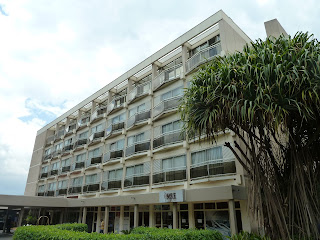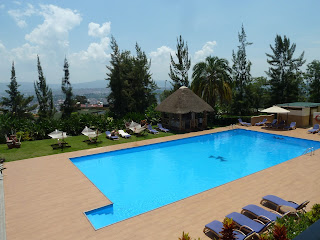Most visitors to Rwanda today come for a brief and close encounter with mountain gorillas in their only remaining natural habitat, an activity that would hold minimal appeal to me even at a fraction of the eye-watering expense of a $750 permit. Instead, my only prior knowledge of a country that has surprised me by its incredible beauty lies in another, more sinister 'g' that will forever remain associated with its history. During a period of just one hundred days in 1994, an estimated 1,000,000 ethnic Tutsi and moderate Hutu were killed in the 20th century's most savagely short genocide.
I remember the story unfolding on the news over the course of the three months of inhuman brutality, and not understanding how it was being allowed to happen without any external intervention. What I do not remember, however, is how quickly the story faded from my memory in favour of the importance of my first year of university life. And why wouldn't it? I had never been to the country, let alone met a Rwandan, after all. Now that I am here, and before I start to sample the local nightlife or plan any mountain excursions, I have an obligation and very real desire to add some historical and social context to my travel ambitions.
Similarly to Cambodia's Killing Fields and Auschwitz-Birkenau in Poland, the Kigali Genocide Museum gives a stark account of the events that unfolded via a series of outstanding chronological audio-visual displays and a memorial garden that is poignant by the virtue of its simplicity. As is usually the case in such recounts of mass human depravity, it is the numbers that do the talking. Aside from the total number of victims and the brevity of the duration, the most chilling statistic of all is that 70% of all Rwandan children witnessed an execution or saw a murder committed in 1994. The confused moto-taxi driver who got me lost three times around the hills of Kigali; the friendly receptionistat my hostel in Kibuye; most of the people I have encountered and those I simply walk past in the street have seen unimaginable horrors. I find this information particularly difficult to digest.
If the museum conveys its historical message with educational efficiency, then the Camp Kigali Memorial where ten Belgian UN Peacekeepers were mercilessly slaughtered in a school building by the Hutu militia does so with bludgeoning brutality. The damaged exterior walls hint at things unspeakable but nothing can prepare me from the horror that lies inside. In the corner of the classroom, an increasingly dense concentration of holes graphically exposes where the cowering men were mown down in a hail of bullets. The image is as indelible as it is harrowing.
By comparison, and in a welcome return to the more upbeat Rwanda of today, the Hôtel des Mille Collines immortalised by Hollywood as Hotel Rwanda is still the capital's leading luxury business hotel. As businessmen, local dignitaries and upmarket holidaymakers relax on their poolside loungers, I wonder how many of them realise that more than one thousand refugees' lives were saved on these very premises. I join the 1% in a gin and tonic, as much for light relief as light refreshment.
Driving around Kigali after having visited the three reminders of the atrocities of 1994, I see the city in a different light. There are more missionary projects, Non-Government Organisations and charity foundations here per capita than in any other African country. The modern downtown architecture and beautifully paved roads have been so successfully financed by the international community's guilt money that it is as though the events of twenty-two years ago have been wiped clean, like my memory a few weeks later. Fortunately the memorials will always be here to remind society of its dark past, just as the stunning natural beauty of the country and its large primates will do for its bright future.
The school building where the Belgian UN Peacekeepers were holed out
No caption required
Hôtel des Mille Collines - a.k.a. Hotel Rwanda
A slightly less crowded pool area 22 years later
Mood song: Million Voices - Wyclef Jean
Mood food: bottled water




.jpg)
.jpg)
No comments:
Post a Comment